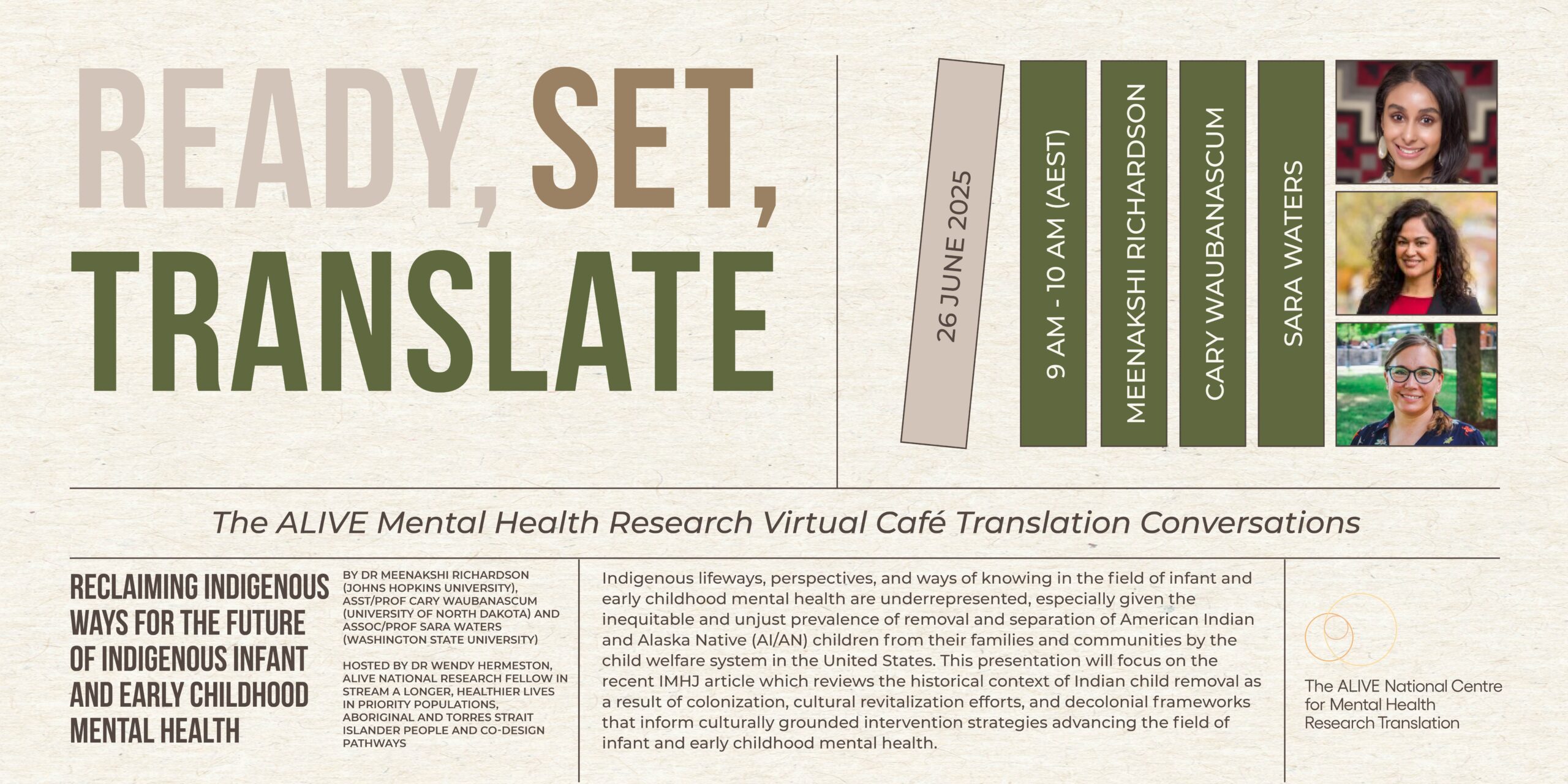Reclaiming Indigenous ways for the future of Indigenous infant and early childhood mental health

The ALIVE National Centre is proud to present the next Ready, Set, Translate: The ALIVE Mental Health Research Virtual Café Translation Conversations, on Thursday 26th June at 9am – 10am (AEST).
Join Dr Meenakshi Richardson, Asst/Prof Cary Waubanascum and Assoc/Prof Sara Waters as they discuss about Reclaiming Indigenous ways for the future of Indigenous infant and early childhood mental health.
Indigenous lifeways, perspectives, and ways of knowing in the field of infant and early childhood mental health are underrepresented, especially given the inequitable and unjust prevalence of removal and separation of American Indian and Alaska Native (AI/AN) children from their families and communities by the child welfare system in the United States. Strengthening the infant and early childhood mental health field requires uncovering and addressing the ways in which colonization has intentionally attempted to disrupt and destroy Indigenous family relationships, especially bonds with young children, both historically and perpetuated into the present day. This presentation will focus on the recent Infant Mental Health Journal (IMHJ) article which reviews the historical context of Indian child removal as a result of colonization, cultural revitalization efforts, and decolonial frameworks that inform culturally grounded intervention strategies advancing the field of infant and early childhood mental health. Decolonization is highlighted as integral for the reclamation of Indigenous caregiving practices. Community-based and Indigenous-led initiatives such as the Indian Child Welfare Act, Tribal home visiting, and breastfeeding programming are highlighted as diverse strengths-based approaches, informed by Indigenous scholarship to ensure the health and well-being of our future generations.
About the speakers:
Meenakshi Richardson, PhD, MS MPH
Assistant Scientist, Center for Indigenous Health, Johns Hopkins University
Meenakshi Richardson is a citizen of the Haliwa-Saponi Tribe and of Indo-Fijian descent. She has worked alongside both reservation-based and urban Indigenous communities, government entities, and community-based organizations serving diverse populations for nearly 10 years to provide health and human services, community-based participatory research, and Indigenous informed systems of care. She engages and advocates for reciprocal collaborations through decolonial praxis to address intergenerational trauma, health equity, and social justice. Her research interests involve trauma transmission prevention among Indigenous populations and communities of color via kinship systems and socio-ecological determinants of health to address various behavioral health outcomes such a substance use, suicide, and toxic stress through culturally grounded prevention and strength-based intervention strategies that center traditional healing practices and Indigenous methodologies. Her identity as an Indigenous woman, urban Indian, person of color, and contributions as a community researcher aligns with interdisciplinary practice beyond Western convention.
Cary Waubanascum, MSW, PhD
Assistant Professor, Department of Indigenous Health, University of North Dakota
Cary Waubanascum is a citizen of the Oneida Nation of Wisconsin, Wakeny^ta (Turtle Clan), with ancestral roots in the Menominee, Forest County Potawatomi, and Stockbridge-Munsee Band of Mohican nations. Her 18-year career as a scholar, educator, technical assistance provider, and social work practitioner has focused on Indigenous family wellbeing among Tribes both locally and nationally. She centers on uncovering and challenging ongoing colonialism in social work and child welfare systems. Relevant expertise includes Indigenous child welfare, reclaiming Indigenous knowledges and lifeways, including strengthening Indigenous kinship for family and community health, teaching and mentoring graduate students, examining the Consolidated Framework for Implementation Science from an Indigenous lens, and strengthening Tribal research and protections through community partnered and engaged research. She lives on the Oneida Nation reservation/Green Bay, WI with her family.
Sara F. Waters, PhD, MS
Associate Professor, Department of Human Development, Washington State University
Sara Waters is a white woman, mother, daughter, and sister living in the homelands of the Multnomah, Clackamas, and other bands of Chinook peoples along the Columbia and Willamette rivers of the Pacific Northwest. Her Western science training is in developmental science and her research focuses on early social-emotional development and the child-caregiver bond as an integral resource for healthy development and entry point for preventive intervention. For the past eight years she has been part of a community-based participatory research project, working closely with members of a Tribal community to develop and evaluate a culturally grounded, trauma-informed parenting program for, by, and of the community. She is part of multiple community-based research projects focused on the health and well-being of families from historically marginalized and minoritized communities. She remains deeply committed to this lifelong, reflexive work which is guided by the principle of doing all things, including research, in relationship.